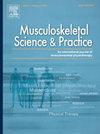ChatGPT is a comprehensive education tool for patients with patellar tendinopathy, but it currently lacks accuracy and readability
IF 2.2
3区 医学
Q1 REHABILITATION
引用次数: 0
Abstract
Background
Generative artificial intelligence tools, such as ChatGPT, are becoming increasingly integrated into daily life, and patients might turn to this tool to seek medical information.
Objective
To evaluate the performance of ChatGPT-4 in responding to patient-centered queries for patellar tendinopathy (PT).
Methods
Forty-eight patient-centered queries were collected from online sources, PT patients, and experts and were then submitted to ChatGPT-4. Three board-certified experts independently assessed the accuracy and comprehensiveness of the responses. Readability was measured using the Flesch-Kincaid Grade Level (FKGL: higher scores indicate a higher grade reading level). The Patient Education Materials Assessment Tool (PEMAT) evaluated understandability, and actionability (0–100%, higher scores indicate information with clearer messages and more identifiable actions). Semantic Textual Similarity (STS score, 0–1; higher scores indicate higher similarity) assessed variation in the meaning of texts over two months (including ChatGPT-4o) and for different terminologies related to PT.
Results
Sixteen (33%) of the 48 responses were rated accurate, while 36 (75%) were rated comprehensive. Only 17% of treatment-related questions received accurate responses. Most responses were written at a college reading level (median and interquartile range [IQR] of FKGL score: 15.4 [14.4–16.6]). The median of PEMAT for understandability was 83% (IQR: 70%–92%), and for actionability, it was 60% (IQR: 40%–60%). The medians of STS scores in the meaning of texts over two months and across terminologies were all ≥ 0.9.
Conclusions
ChatGPT-4 provided generally comprehensive information in response to patient-centered queries but lacked accuracy and was difficult to read for individuals below a college reading level.

求助全文
约1分钟内获得全文
求助全文
来源期刊

Musculoskeletal Science and Practice
Health Professions-Physical Therapy, Sports Therapy and Rehabilitation
CiteScore
4.10
自引率
8.70%
发文量
152
审稿时长
48 days
期刊介绍:
Musculoskeletal Science & Practice, international journal of musculoskeletal physiotherapy, is a peer-reviewed international journal (previously Manual Therapy), publishing high quality original research, review and Masterclass articles that contribute to improving the clinical understanding of appropriate care processes for musculoskeletal disorders. The journal publishes articles that influence or add to the body of evidence on diagnostic and therapeutic processes, patient centered care, guidelines for musculoskeletal therapeutics and theoretical models that support developments in assessment, diagnosis, clinical reasoning and interventions.
 求助内容:
求助内容: 应助结果提醒方式:
应助结果提醒方式:


